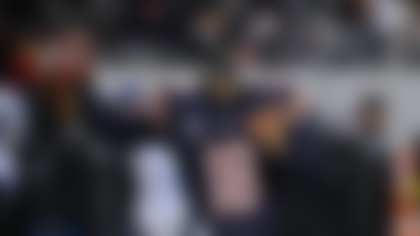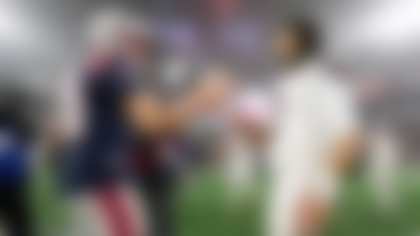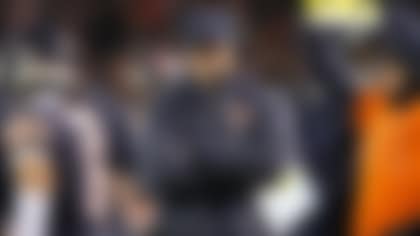The recent retirement of Detroit Lions wide receiver Calvin Johnson left quarterback Matthew Stafford in a mood to gush on the team's website. Stafford talked about how much Johnson will be missed, all the humility the six-time Pro Bowler displayed and the memories the entire team will cherish in the wake of Johnson's departure.
The critical topic Stafford didn't touch on is one that will be far juicier to discuss in the coming months: The question of what kind of quarterback he will be now that his best weapon has packed it in.
Johnson's decision to retire is easily the most stunning news of this offseason. It's the second time a superstar has quit the Lions in his prime -- as Barry Sanders did after the 1998 season -- and it leaves Stafford facing the most critical season of his NFL career. Johnson, also known as Megatron, was the kind of weapon every quarterback covets. In many ways, he made life easier for Stafford from the moment the signal caller entered the league as the top overall pick in the 2009 NFL Draft.
Those days are over. The high-risk passes that Stafford often lofted into double coverage aren't going to land in Johnson's hands anymore. The constant attention that Johnson drew from opposing defenses also means the Lions will need more from wide receivers like Golden Tate and newly signed free agent Marvin Jones. Stafford has spent the last seven years going through a variety of growing pains and leading Detroit to a 42-51 record when he's started. This fall has to be the time when his maturation process, at age 28, takes a huge leap forward.
That's not to say Stafford hasn't been trending in the right direction already. He was solid in 2014 and even more impressive in the second half of the 2015 season. After his struggles factored mightily in Detroit's 1-7 start, Stafford completed 70 percent of his passes with 19 touchdowns and two interceptions in those final eight games. Those numbers played a huge role in Detroit going 6-2 during that stretch.
The upcoming challenge for Stafford is to win games when the Lions had a hard time doing that while blessed with an all-time great. Over the past seven years, Johnson averaged 86 receptions, 1,362 yards and nearly 10 touchdowns a season. But his collaboration with Stafford only amounted to two postseason appearances (in 2011 and 2014) and zero playoff wins. That run of futility likely had something to do with Johnson's decision to end his career at age 30.
There's no question that Stafford's confidence in his arm -- which already was sky-high -- went to a different level when Johnson was his target. If they kept records for how often a quarterback attempted a nearly impossible throw to a receiver, then Stafford would've led the league every year in his desire to connect with Johnson. In fact, one of the comments Stafford gave the Lions' website said all you need to know about his faith in Megatron: "I will always remember when [Johnson] broke Jerry Rice's single-season receiving record [1,964 yards in 2012] and all of the big plays he made, thinking, Did he really just come down with that one?"
It's fair to question whether Stafford can lead the Lions to loftier heights in the coming years. He's always looked the part of a man who could carry a franchise -- cavalier presence, big arm, mentally and physically tough -- but the end result has too often been lacking. There have been too many moments when he's fired questionable passes (usually toward Johnson) that wound up being picked off by defenders at the worst possible times. As much as Stafford knew what he had to do, he also had a penchant for piling up big numbers more often than wins.
The upside for Detroit is the bond that has grown between Stafford and offensive coordinator Jim Bob Cooter, who was the Lions' quarterback coach last season before the team fired former coordinator Joe Lombardi in late October. Cooter's philosophy required that Stafford unleash the ball faster and also use more of his options in the offense. Johnson still got his touches. The only difference is that Stafford had more games when other players seemed more involved in the game plan.
It's intriguing to think about what Stafford can do with a full offseason to work with Cooter. The quarterback hasn't hidden his admiration for the coach, and Cooter clearly has brought more discipline to his quarterback's game. You'd have to go all the way back to 2011 -- when Stafford surpassed the 5,000-yard, 40-touchdown plateau -- to find a better season than Stafford produced in 2015. By completing a career-high 67.2 percent of his passes for 4,262 yards and 32 touchdowns (with 13 interceptions), he flashed the kind of potential that offers hope for bigger things later in his career.
Stafford basically is reaching the same fork in the road that should be eerily familiar to signal callers like Chicago's Jay Cutler and Atlanta's Matt Ryan. They all have great talent, but their respective careers have become more challenging the longer they've played. Some of that has to do with coaching changes or roster attrition. Most of it has to do with all the expectations that followed them into the NFL.
Stafford arrived with as much hype as anyone could expect from a top overall pick. He also showed his toughness by fighting through shoulder injuries early in his career and displayed some true grit in clutch situations. Those were the days when Lions fans couldn't wait to see what Stafford did next. Nobody could've predicted the kind of inconsistency that plagued him over the last few years.
This is why it is imperative that Stafford makes huge strides this coming season. The Lions just spent the past few months hoping that their worst fear wouldn't be realized -- that their biggest star would decide to hang up his cleats. Now they have to pray that there isn't a double whammy in the works for this long-beleaguered franchise. They have to hope their quarterback can make up for everything they just lost with Johnson's departure.
Follow Jeffri Chadiha on Twitter @jeffrichadiha.












